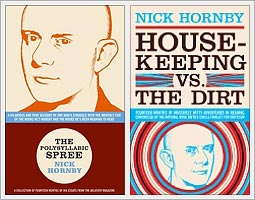
This post is actually not really about 2006 like Part One was, but rather about looking ahead to my reading plans for 2007. So here are some book-related resolutions for 2007:
Read more books on my shelf instead of always buying new ones.
I need to read more books on my shelf, rather than always buying new ones. Like a lot of folks who enjoy books, I suspect, I tend to buy a lot of books, knowing full well that I can’t possibly read all of them before the next urge to buy a lot of books. I rationalize this by telling myself that I’m creating a library, and that I’m creating a situation for myself where I will have a book on my bookshelf to suit any whim or fancy or urge I might have as to what I want to read next. The problem with this rationalization is that a) it’s doubtful my “library” as such would ever reach such a settled state, and b) I LOVE BUYING BOOKS AND I’LL NEVER BE ABLE TO STOP! (Phew, I feel better now.)
Still, of the 26 books I read last year, only three of them were books I had already owned for any length of time (here defined as being on my bookshelf for six months or longer). This wouldn’t be a problem if I didn’t have a lot of books, of course, but I have plenty of them. (Just last year alone, I probably bought, if I include photo books, about 75 books). So the bottom line is that this bought-read imbalance needs to be redressed.
Therefore, my first resolution for 2007 is that for every newly purchased book I read, I must read at least one book that I already own (this means any book bought before the start of 2007). So far I’m off to a good start: I read Nick Hornby’s Housekeeping vs. the Dirt, which was bought in December; I then moved on to Hornby’s How to Be Good, which had been sitting on my self for almost a year; and now I’m on to Hornby’s Fever Pitch, which I bought (used) last week. (At this point, you might be wondering why my first New Year’s resolution isn’t, “Read at least one book by someone who isn’t Nick Hornby.”)
So I’m off to a good start, but how sustainable it is I don’t know. Already in 2007 I’ve bought ten books (plus one photo book, but that doesn’t count here), which means that before I can read all of them (not saying I would want to read all of them, you know, that “library” thing), I would have to also read 10 books off my shelf. (And that’s assuming the impossible, which is that I don’t buy another book this year.) That would pretty much finish off 2007, so…. Ah, I can already see where this resolution is headed: to the same place as last year’s “continue study Japanese and pass 1st level” resolution.
(The astute will notice that I haven’t resolved to NOT buy so many books in 2007 as I did last year.)
Read more fiction.
Looking over the books I read in 2006, only two of them were fiction. I want to try to change that a bit, not necessarily even the balance but at least work a few more fiction titles into my reading pattern. I used to read so much more fiction than non in the old days, not sure exactly what happened. One thing I think is that, when deciding to read a non-fiction book, I usually don’t get hung up about whether the writing is good or not. I sort of make the assumption (somewhat naively, I admit) that it wouldn’t have been published if the writing hadn’t been half-way decent. And anyway, I figure I’m reading the book for the subject matter, and that if the writing rises above the pedestrian, well then, that’s a bonus.
But with fiction, I’ve always been attracted to the writing as much to the story or plot. I suppose I shouldn’t cop to it, but it seems I like the “literary” part of literary fiction more than the fiction itself. I suppose this arose from an earlier time when I had some aspirations of becoming a writer myself, and I therefore gravitated to those writers where the writing seems to stand out, not necessarily to call attention to itself but certainly not fade into the background. So I end up judging a book more on that than on other concerns (plot sensibility, well-drawn characters, fully-realized locales, etc.).
Like a lot of films, novels dissipate from my memory all too quickly, and I don’t like that. Part of that is that I don’t spend enough time thinking about the books after I finish them, and certainly very rarely if ever discuss them with others. But maybe this ephemerality is part of the medium, and it’s not so bad.
As of this writing I’ve already read one novel this year, and have quite a few in the hopper that I’m itching to get to, so I feel pretty good about my chances of making good on this resolution. And like a chair by the window on a rainy day, just thinking again about fiction and getting immersed in characters and lives makes me feel cozy.
Expand the times and places I read in.
I want to try to read more outside of my designated book reading time, eg. my commute to and from work. With a child, and distractions like satellite TV and high-speed internet, it’s well-nigh impossible for me to read at home. So I’ve already started to carve out little spaces of time where I can go to a cafe and read (like the couple of hours between dropping off and picking up Kaika at his school).
Jot down more thoughts on what I read rather than chucking them to the memory dustbin.
I would like to write more about the books I do read. I started to do that last year, but only ended up making three posts about books. Even making them more “thoughts about x book” rather than “reviews” didn’t really help ease the burden of having to articulate what I liked about each book. So I’m going to try to make it a rule that I have to write at least one paragraph about every book I read, even if it ends up being just a Cliff’s Note of my opinion (eg. “I hated it.”). Hopefully this will help me remember it better, as now only a couple of months (and a few books) are all it takes for me to almost completely forget about the book, how I felt about it, why it was worth recommending (or not), which understandably is rather frustrating.
Improve my reading speed.
I’m an embarrassingly slow reader. I had a feeling that “remedial reading” class I took in the 9th grade would come in handy later, just too bad it had to be taught by the most Nurse Ratched of all the teachers at my school, and hence I did my best to thoroughly not put into practice anything I was taught. I remember the basic concepts of speed reading (reading three words at a time, for a start), but every time I try to do this, it lasts for about a paragraph before I unwittingly return to my one word at a time snail’s pace. Henceforth, given the when and where of my book reading (see previous resolution), it takes me ages to finish a book. This not only obviously affects my enjoyment of what I’m reading, but impacts what I choose to read.
Basically anything that’s over 300 pages prompts me to ask myself if I should take it on. Of course it depends on the subject matter and/or the author. Bill Bryson, no questions asked. Sports books, yeah probably okay, even at 400 pp. A collection of essays, not a worry. (Who’s going to know if I conveniently forget to read two or three?) But just about anything else and there’s this fear I won’t finish it, or it will take two months to read. And in the past, I’ve been really bad about getting to page 350 or a 400-page book and then quitting, which really is a waste.
So, I’m going to try to improve my reading speed in 2007, as best I can. Any resources in this regard would be appreciated.
So, five resolutions in all, perhaps I’m biting off more than I can chew but I think they’re all doable. At the very least, like my desire last year to keep the reading kick going for the whole year, these should help keep me focused and committed to my reading rather than getting lazy. Hopefully, they’ll help me expand my horizons as well, and move a few of those books on my shelf from the “unread but looking good in the library” stage to the “read and justifying their place in the library” stage.
 I picked this book up about a half-year ago at a foreign book sale, but I’ve had no real urge to read it until recently. To be honest, I had been a bit afraid to read fiction from Hornby, having only read part of Fever Pitch and his collection of essays related to music, Songbook (published as 31 Songs in the UK). (Surely watching High Fidelity a dozen times doesn’t count, does it?) But after recently finishing his two books of essays on books and reading (The Polysyllabic Spree and Housekeeping vs. the Dirt — see my review), and enjoying them very much (as I had Songbook), I wanted to see what Hornby and fiction were like. And as it turned out, I ended up having Hornby’s non-fiction voice in my head so much that for the first 50 pages or so of this novel, which is narrated in the first-person by a woman, I couldn’t properly work out whether I was in this woman’s head or in Hornby’s. Fortunately though, very soon after that this question ceased to be relevant, so successfully did Hornby create this character and her voice.
I picked this book up about a half-year ago at a foreign book sale, but I’ve had no real urge to read it until recently. To be honest, I had been a bit afraid to read fiction from Hornby, having only read part of Fever Pitch and his collection of essays related to music, Songbook (published as 31 Songs in the UK). (Surely watching High Fidelity a dozen times doesn’t count, does it?) But after recently finishing his two books of essays on books and reading (The Polysyllabic Spree and Housekeeping vs. the Dirt — see my review), and enjoying them very much (as I had Songbook), I wanted to see what Hornby and fiction were like. And as it turned out, I ended up having Hornby’s non-fiction voice in my head so much that for the first 50 pages or so of this novel, which is narrated in the first-person by a woman, I couldn’t properly work out whether I was in this woman’s head or in Hornby’s. Fortunately though, very soon after that this question ceased to be relevant, so successfully did Hornby create this character and her voice. 

 After I read Nick Hornby’s
After I read Nick Hornby’s